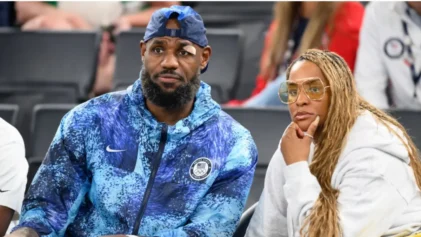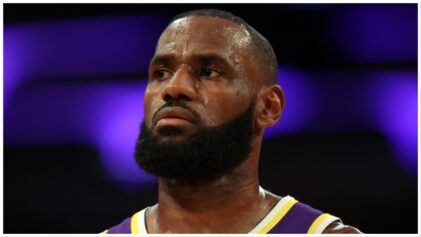Four years ago, I wrote a column for the Louisville Eccentric Observer entitled, “Die and burn in hell, LeBron: Our unhealthy obsession with sports.” The piece was in response to what I saw as rather primitive and visceral reactions to LeBron James leaving the Cleveland Cavaliers for the Miami Heat. Recently, the narrative took a twist no one expected in 2010 when James reversed course – leaving Miami to return to Cleveland. In light of this stunning turn, my column deserves a revisit.
After announcing he was “taking his talents to South Beach,” television footage captured Cavaliers fans burning James’ jerseys, screaming, crying and, well … generally losing their minds. Clevelanders quickly morphed from “witnesses” to James being the “chosen one,” to painting him as the quintessence of evil and damning him to hell. Given the chance, some may have shot him dead in the streets just as Colombian soccer player Andres Escobar was killed in 1994 after scoring an own-goal in that year’s World Cup. The scene was sick and sad.
Dan Gilbert, the Cavs’ owner, even released a letter calling James’ departure for Miami a “cowardly betrayal” and his hour-long ESPN “Decision” special “narcissistic” and “self-promoting.” Gilbert’s letter was so scathing that the National Basketball Association fined him $100,000 (which fans offered to pay; Gilbert declined). Jesse Jackson even opined that Gilbert was approaching James like a “runaway slave.” The entire situation was uncomfortable.
To say the story has taken a dramatic turn less than a half-decade later would be an understatement. In a moving essay on SI.com simply entitled “I’m Coming Home,” James recounts how the last four years have brought profound changes to how he sees the world. He talks about how he now realizes his ties to Northeast Ohio run much deeper than basketball. He reflects on his own maturation and redirection. In one of the piece’s most powerful passages, he speaks of the reaction and pain of Cleveland fans and the team’s owner in 2010:
“To make the move [back to Cleveland] I needed the support of my wife and my mom, who can be very tough. The letter from Dan Gilbert, the booing of the Cleveland fans, the jerseys being burned — seeing all that was hard for them. My emotions were more mixed. It was easy to say, “OK, I don’t want to deal with these people ever again.” But then you think about the other side. What if I were a kid who looked up to an athlete, and that athlete made me want to do better in my own life, and then he left? How would I react? I’ve met with Dan, face-to-face, man-to-man. We’ve talked it out. Everybody makes mistakes. I’ve made mistakes as well. Who am I to hold a grudge?”
Both James’ ill-fated 2010 “Decision” and his well-received 2014 Sports Illustrated essay were made possible because we now live in a reality show culture driven by voyeurism and celebrity obsession. Substance has all but left the building. Even in people’s personal lives, it’s all about the illusion of success, happiness, and depth. Very little is real for them. Trapped in these desolate, false lives of their own construction, they try to find something, anything reaffirming to hold onto.
For many Cleveland fans, LeBron James’ job was to make them whole. The same is true of sports fans around the country. Let’s face it — none of them (Gilbert included) would have said a word about his failures if James had initially chosen to remain with the Cavaliers. He didn’t just leave, he broke their hearts, shattered their dreams because they have so very few achievable ones of their own. That’s what many people have become in today’s society — vacuous, painfully mediocre beings living vicariously through others. To a much lesser degree, LeBron is now facing negativity in Miami driven by this same emptiness. The immediate defacing of a Miami mural featuring him after he announced his exit from South Florida is evidence.
In the grand scheme of things, who cares? As ESPN analyst, former NFL player, and coach Herm Edwards recently said – in the superstore of life sports is just the “toy department.” When placed into context, where LeBron James hoops just isn’t that important. On the macro-level, this is really about a misplaced societal priority system. We wrongfully deify professional athletes and tolerate them making hundreds of millions of dollars while primary and secondary school teachers are lucky to make $40-$50K. Which is more important? Hint: Athlete isn’t the answer. Other discrepancies abound in this muck populated by people consumed with entertainment and entertainers (which is all sports and athletes are when everything is stripped away). We really need to get some perspective.
That said, for what it’s worth – the latest chapter in the LeBron James story is intriguing and encouraging. It displays that while our focus on sports is overblown, games and their gladiators can also be instructive. James’ decision to go home shows us that forgiveness is a good thing and grudges are bad. He is not imprisoning himself, Dan Gilbert, or Clevelanders in the past, but is allowing all to boldly grasp the future. He is teaching some that immediate gratification is not always best. In fact, it’s often damaging. He’s also saying to the unfailingly arrogant inhabitants of places like Miami, New York, Boston, Chicago, and Los Angeles that everyone doesn’t want to live in their cities. There is a world outside of them. Above all, he is admitting failures and mistakes. Despite his god-like athletic ability, he is reaffirming his humanity.
So, four years ago Cleveland tossed LeBron James into the pits to burn in hell. Now, he is resurrected and so are their hopes. It is a fantastic story and I don’t mind saying I’m rooting for him. Now, if only Aaron Rogers, Richard Sherman, LeSean McCoy, and a few others would bolt from their teams for my Atlanta Falcons I’d really be happy!
Until next time — MAINTAIN!
_____________________
Dr. Ricky L. Jones is Professor and Chair of the University of Louisville’s Pan-African Studies Department. His books include “Black Haze: Violence, Sacrifice, and Manhood in Black Greek-Letter Fraternities” and “What’s Wrong with Obamamania?: Black America, Black Leadership, and the Death of Political Imagination.” He has written a longtime award-winning column, “Keeping Up with the Jones,” for the Louisville Eccentric Observer and is a new scholar writer for Atlanta Black Star. His columns are archived at http://www.leoweekly.com/category/column-name/keeping-jones. Visit him at www.rickyljones.com.


